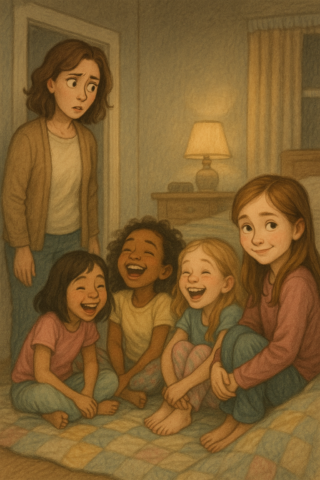It’s a strange feeling, seeing your own life twisted into something unrecognizable—especially when it’s your sibling doing the storytelling. I always knew my sister, Tessa, was gifted with words. She’d been writing poems and stories since we were little, charming teachers and relatives alike. But nothing prepared me for the shock of seeing her version of our family history splashed across the internet, gaining sympathy and praise from total strangers.
It started innocently enough. I saw a post of hers go viral—a long, emotional thread about growing up “in the shadows,” feeling unloved, and being overlooked by her parents and her “perfect older sister.” That last part stung. Tessa described incidents that either never happened or were so twisted by exaggeration that I barely recognized them: times I supposedly left her out, family events where I “hogged” attention, moments she claimed our parents celebrated me but ignored her.
The comments flooded in. “You deserved better.” “Your sister sounds awful.” “Sending you so much love.” Friends from high school reached out to say they never knew how hard Tessa had it. Old acquaintances from our hometown shared the post, some even tagging me.
The Ache of Being Misrepresented
At first, I was angry. My gut reaction was to defend myself, to correct every detail, to post my own version of the story. But I hesitated. I didn’t want to start a public feud, especially with family. I messaged Tessa privately. “Why are you saying these things?” I asked, trying to keep my words calm.

She replied quickly, but not apologetically. “It’s how I felt, okay? Maybe it wasn’t your experience, but it was mine. People finally see me for once.”
I understood, in a way. Tessa always struggled to feel seen, and social media had given her the spotlight she’d been craving. But the attention came at a cost: my reputation, our parents’ feelings, and the truth.
When the Internet Chooses Sides
For weeks, the tension simmered. Our mom called in tears after seeing the post. “Did we really do all that?” she asked. I reassured her, listing all the ways we’d tried to support Tessa, remembering birthday parties and special outings, but I could hear the doubt in her voice. Some of my friends distanced themselves, uncomfortable with the drama or unsure what to believe.
I struggled with how much to say publicly. Was it worth correcting the record if it only made things worse? Was my side of the story less important because it didn’t get “likes”?
The Conversation That Finally Happened
Eventually, I invited Tessa out for coffee, away from screens and followers. I told her, honestly but gently, how her words hurt me and our family. “I’m sorry if I ever made you feel invisible,” I said. “But it’s not fair to rewrite our history for sympathy. The truth matters—even if it’s messy and complicated.”
Tessa listened, eyes brimming with tears. “It just feels good to have people on my side for once,” she admitted. “I never wanted to hurt you. I just… wanted someone to hear me.”
We talked for a long time. We didn’t solve everything. But for the first time, I understood her loneliness, and she saw the pain her story caused. She promised to be more thoughtful in the future, to write from her heart—but also with honesty.
What I Learned
Social media rewards the dramatic, the emotional, and the simple. But real life—and real families—are rarely so black and white. I learned that you can’t always control how others see you, online or off. The best you can do is live with integrity, stand up for the truth, and try to repair what matters most in private, not public.
Tessa and I are still working on rebuilding trust. It’s not easy, but it’s real.
Final Thought
If someone rewrites your shared past for sympathy or attention, don’t let resentment be your only response. Talk to them—offline, honestly, and with as much compassion as you can muster. The truth may be quieter than a viral post, but it’s worth fighting for.


